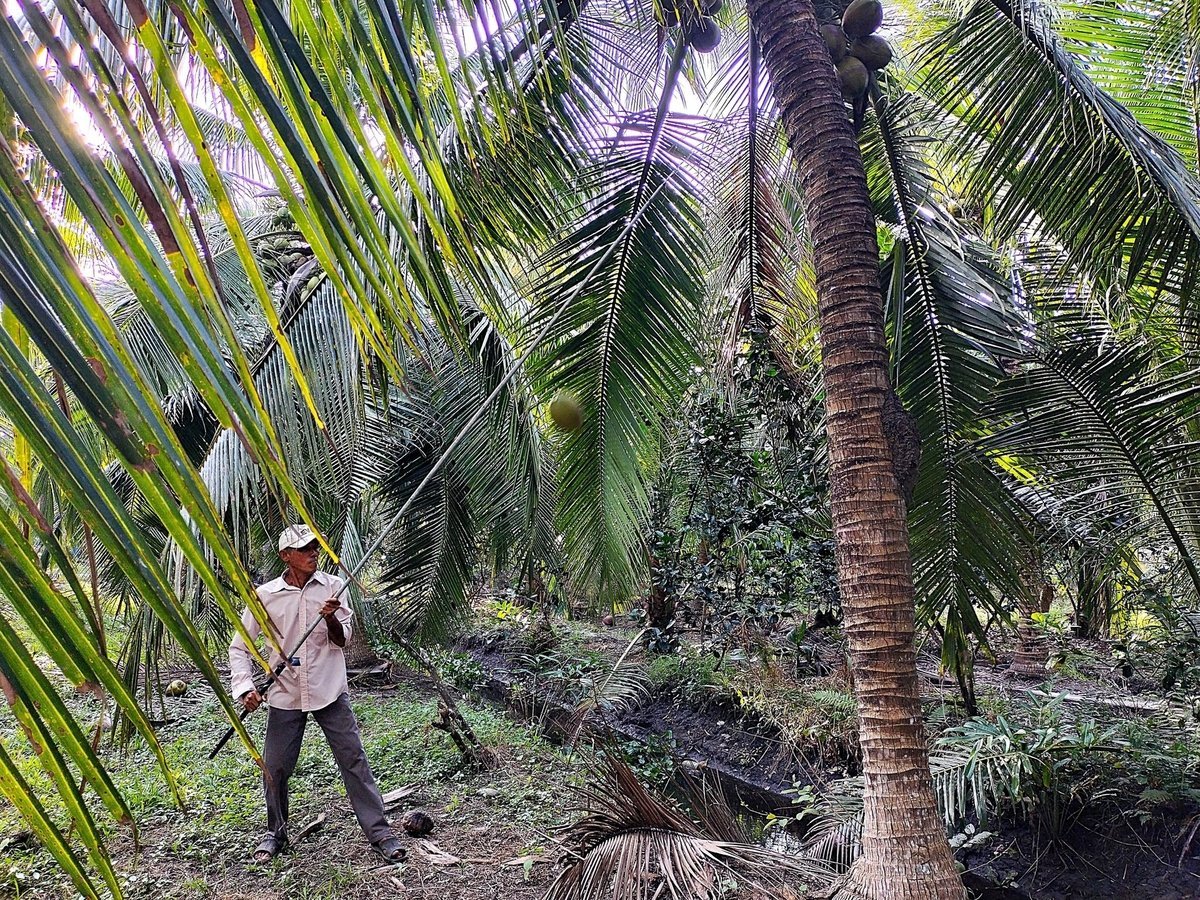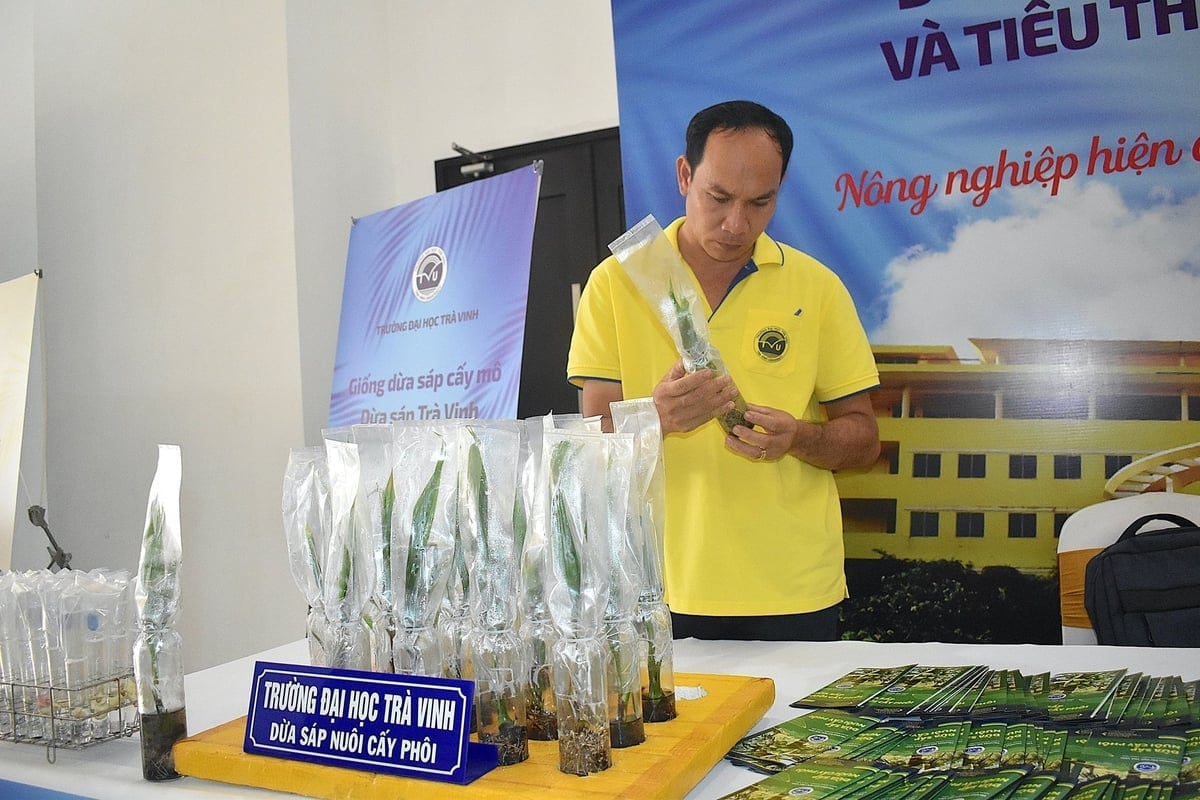December 4, 2025 | 13:24 GMT +7
December 4, 2025 | 13:24 GMT +7
Hotline: 0913.378.918
December 4, 2025 | 13:24 GMT +7
Hotline: 0913.378.918
In Ben Tre province, Tra Vinh University, the Vietnam Coconut Association, and local departments of Ben Tre recently held a meeting to discuss research and development strategies for the coconut industry.
Ben Tre currently has about 80,000 hectares of coconut plantations, Tra Vinh 30,000 hectares, and Vinh Long over 10,000 hectares. In the near future, with the administrative reform of the three provinces - Vinh Long, Ben Tre, and Tra Vinh - into a new province named Vinh Long, large agricultural raw material zones will be formed. Among them, a major coconut-growing area covering 120,000 hectares will be established, making it the largest in the country and accounting for approximately 60% of Vietnam’s total coconut cultivation area.

After the reform, the new Vinh Long province will have about 120,000 hectares of coconut plantations, accounting for 60% of the country’s total. Photo: Minh Dam.
Mr. Huynh Quang Duc, Deputy Director of the Department of Agriculture and Environment of Ben Tre Province, stated that the formation of a large-scale, centralized coconut material zone in the new Vinh Long province, following the merger of Vinh Long, Ben Tre and Tra Vinh, will enhance the effectiveness of disease prevention and control in coconut cultivation. This is due to the ability to implement synchronized measures on a broader scale. Moreover, it lays a crucial foundation for the development of Vietnam’s coconut industry.
According to Assoc. Prof. Dr. Diep Thanh Tung, Vice President of Tra Vinh University, coconut is one of Vietnam’s six key industrial crops, with an export value exceeding USD 1 billion. Therefore, research on the coconut industry in the new Vinh Long province will have a significant impact on the overall growth of Vietnam’s coconut sector.
Dr. Tung shared: “Tra Vinh University recognizes the importance of coconut in economic development. Under the new conditions, the university has established the Mekong Delta Coconut Institute to harness the sector’s strengths".
He added that Tra Vinh University is currently conducting numerous research projects related to the coconut product value chain, such as: reducing the cost of wax coconut seedlings (via tissue culture and embryo culture); applying AI to monitor and care for coconut trees; designing and manufacturing integrated machines for husking and fiber-stripping of Siamese coconuts; selecting and propagating coconut varieties using tissue culture techniques; researching processes for producing paper from coconut by-products; measuring carbon credits in coconut-growing regions and connecting them to trading platforms.

Embryo-cultured wax coconut seedlings developed by Tra Vinh University. Photo: Minh Dam.
Mr. Cao Ba Dang Khoa, General Secretary of the Vietnam Coconut Association, pointed out several challenges facing the coconut industry in Vietnam that have led to the low value of coconuts, with post-harvest technology being one of the most concerning issues.
"We need to find ways to reduce the cost of harvesting and transporting coconuts to the lowest possible level. Currently, in some areas, the cost is around 7,000 VND per dozen (12 coconuts), but in other areas, it ranges from 20,000 to 25,000 VND", said Mr. Khoa.
In addition, the current coconut orchard planning by local farmers does not meet the required standards, and there are still many issues regarding coconut varieties that need to be addressed. Therefore, Mr. Khoa believes that the Mekong Delta Coconut Institute under Tra Vinh University should play a more active role in making practical contributions to Vietnam's coconut industry.
$ 1 = VND 25.751 - Source: Vietcombank.
Translated by Phuong Linh

(VAN) As of 2025, the ASEAN region has a total of 69 ASEAN Heritage Parks recognized across its 10 member states. Among them, Viet Nam contributes 15 ASEAN Heritage Parks.

(VAN) Yok Don National Park has high biodiversity with numerous endemic plant and animal species, and it is also the only dipterocarp forest ecosystem conservation area in Viet Nam.

(VAN) Viet Nam and Brunei signed two important MOUs on fisheries and IUU, expanding cooperation in agriculture, the environment, and Halal exports, aiming to substantively implement joint projects.

(VAN) The Viet Nam Coconut Association worked with the International Finance Corporation (IFC) and businesses to promote the supply chain, enhance competitiveness, and develop the coconut industry sustainably.
![Hue aims for Net Zero: [2] Pioneering low-emission tourism](https://t.ex-cdn.com/nongnghiepmoitruong.vn/608w/files/huytd/2025/12/04/0633-dulichzero-4-095634_236-161125.jpg)
(VAN) The ancient capital of Hue has developed Net Zero tourism products and models, aiming to reduce carbon emissions and pioneer the establishment of Viet Nam's green tourism destination.

(VAN) C.P. Viet Nam has announced the successful completion of its goal to plant 1.5 million trees during the 2021-2025 period, a key milestone within company's long-term ESG strategy and its roadmap for emission reduction.

(VAN) This is an initiative of MAE aimed at creating a unified coordination mechanism to implement agricultural cooperation programs with developing countries.